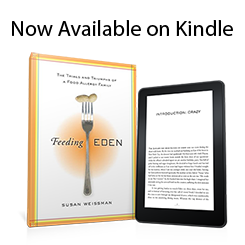“Tell Me Where It Hurts”
The dots that connected my son’s multiple life threatening allergies to his early developmental delays confused us at first. It went something like this: While still a baby, Eden had a series of minor allergic reactions and some significant allergic reactions during the year plus we tried to understand what foods he was allergic to, and, how to avoid even trace amounts of those foods. And that painful process interfered with his early learning processes.
Eating: Imagine working on chewing and swallowing new food when much of what you have eaten or drank was vomited back up your throat. Interactive Play: Imagine playing Peek-A-Boo while your lips are still itchy and swollen from your lunchtime jar of applesauce. Gross Motor Skills: Imagine mustering the strength to pull your body up into a standing position when you were awake most of previous night scratching at your eczema, hungry and yet a little nauseous.
Speaking: My first child taught me that children could make babbling sounds, which can turn into a functional vocabulary. She often made these sounds when well rested and energized. Now imagine the fog of an antihistamine. In fact, had it not been for my developmentally punctual first child, I might have overlooked Eden’s one-year old quirks like, stiffening dramatically at noises, dropping his toys and bottles, crying out when in open spaces like parks and calming only with particular arm holds or stroller positions. These quirks turned out to be a pervading sensory sensitivity. The world may have felt as threatening to him as his food. So Eden did not do many things a healthy child would predictably do. And for a period of two years he received various therapies from New York State licensed therapists. With therapy, by the time Eden was three years old he could eat, move, talk and function like . . . a three-year old.
Years later, this past summer, I bumped into Eden’s speech therapist. After a few minutes of talking, while I was pulling out my iPhone to show off a picture of Eden diving into a pool, she looked into me. “You know you once said something to me that I’ll never forget. When we first met and I asked you about your goals you said, ‘I just want for Eden to be able to tell me where it hurts.’ ”
Our eyes welled simultaneously with tears even as I assured her, “Oh my god. I don’t. I don’t remember saying that. But I can tell you that he has no problem doing that now when it comes to certain stuff. He’s very specific.” We laughed together.
Also this summer I read Sandra Beasley’s memoir, Don’t Kill the Birthday Girl. In it, she narrates what it was like to be among the few severely allergic kids of her generation and she offers up medical and research information along the way. In the past I’ve hazarded guesses at Eden’s inner landscape and given so much thought to what might feel like to be allergic to so many foods. I’ve listened to the wisdom of the parents in my support group and to the allergy community at large. And of course, I’ve relied on the open bond with Eden to guide and support him.
Sandra Beasley gave me insight into the physical sensations of minor allergic reactions . . . like the “bubbles” that rise in her chest. She also described what those "close calls" feel like and unfortunately, despite my best safety practices, Eden has a few of those in the past years. Sandra Beasley pointed out the illogical but understandable moments she “hid” her reactions from potential boyfriends and she validated a host of other food allergy behaviors that I’ve already witnessed while bringing up Eden.
I'm aware that Sandra Beasley has also stirred some controversy within the allergy community. I'm not going there, insead right here -- Parts of her book may help Eden “tell me where it hurts.” And for that I’m grateful.

 What I Do Now:
What I Do Now: